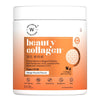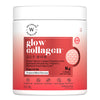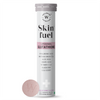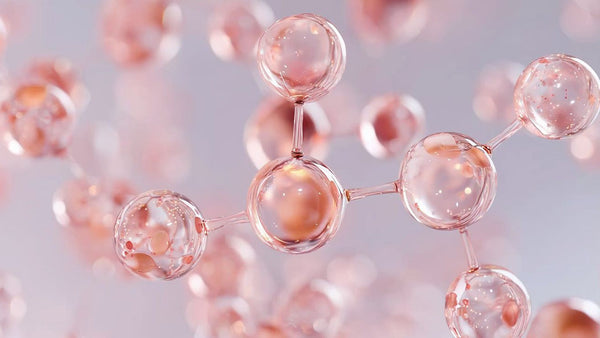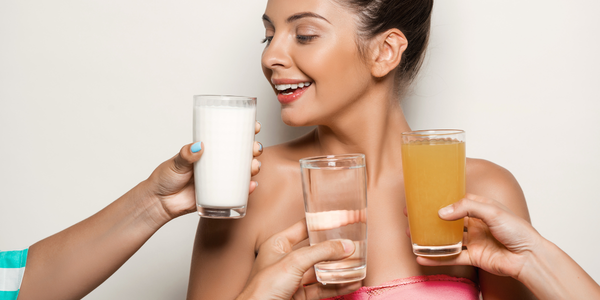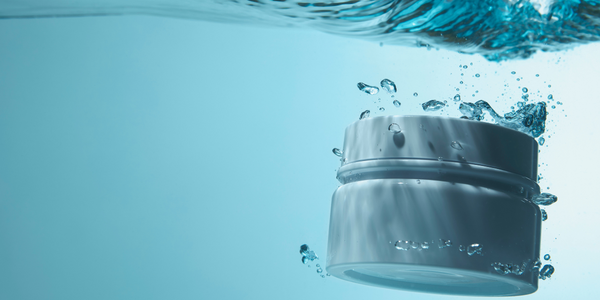Collagen is a protein found in the body that decreases with age, unhealthy lifestyle practices, or overexposure to the sun. A lack of this collagen is expressed by the body in the form of certain signs and symptoms. Before we jump to these collagen deficiency symptoms, let's learn about collagen and its role.
Nearly 30% of your body’s protein is made up of collagen. Collagen has derived its name from the Greek word "kolla," which means "glue," since it holds various parts and structures of the body together. Collagen is produced by our bodies by breaking down the protein we eat into amino acids, which are the building blocks from which our bodies can produce new proteins. However, the production of collagen begins to decline by 1.5 percent each year from the time we enter our 20s. Hence we need to supplement collagen externally through food sources or collagen supplements.
No wonder collagen has been able to make its place in the supplement market as one of its top ingredients.
What is Collagen?
Collagen is a structural protein. It is the main component of connective tissue, which makes up your skin, bones, tendons, and joint cartilage. It is also found in your muscles, organ tissue, ligaments, blood vessels, and intestinal lining. It provides strength, structure, and support to these tissues. Collagen is produced in the body and can be obtained through animal sources like meat and seafood. Around 28 types of collagen have been identified, each with different structures and functions. Let's look at some of the important types of collagen.
Types Of Collagen
There are five main types of collagen found at different sites in the body.
-
Type I Collagen-
This type is responsible for providing strength and structure to your bones, tendons, skin, and ligaments. Around 90% of the collagen found in the human body is type 1.
-
Type II Collagen -
This collagen helps you with joint support and is found mostly in the cartilage
-
Type III Collagen-
Your muscles, arteries, and organ tissues are made up of Type III collagen.
-
Type IV Collagen -
The layers of your skin contain Type IV collagen.
-
Type V Collagen -
The tissue of the placenta, the cornea of your eyes, and some layers of the skin contain Type V collagen.
Factors Responsible for Collagen Decline
Along with aging, certain lifestyle factors and external stimuli listed below cause a drop in collagen levels in your body.
- Sedentary Lifestyle
- Stress
- Alcohol Consumption
- Smoking
- Excessive Exposure to Sun
Signs that You may have a Collagen Deficiency
Collagen levels cannot be easily tested in your blood, and measuring collagen through other methods could be tedious. But there are certain body signs that could be indicating a drop in your collagen levels. We’ve listed seven common signs of collagen deficiency symptoms for you.
1. Wrinkles & Fine Lines
Collagen benefits for the skin are plenty. It acts as a scaffolding (a framework or structure) for the skin, hence, losing collagen levels makes your skin sag and wrinkle. Losing skin collagen would also mean losing the thickness and strength of the epidermis, causing it to lose its elasticity. Collagen deficiency also causes the eyes to sink and the cheeks to thin and darken around the eyes.
Fine lines begin to appear in the skin when the breakdown of collagen exceeds its production. Collagen, along with elastin and hyaluronic acid, plays a vital role in providing stability, increasing moisture retention, and reducing fine lines.
2. Joint Pain or Osteoarthritis
If you are over 20 and have been experiencing joint pain lately, it's possible that you are suffering from low collagen levels. Cartilage, synovial membranes, ligaments, and tendons help us move our joints effortlessly, or rather, painlessly. Since collagen is the main component of these tissues, a decline in its levels can make mobility painful around hinges like the knees or the ball and socket joints between the hips and shoulders, leading to osteoarthritis.
3. Thinning, Greying Hair & Brittle Nails
As if fine lines and wrinkles weren’t enough, loss of collagen brings about thinning of the hair and brittle nails too. Keratin, an important hair and nail protein, is made from proline and glycine, which are found in collagen. Thus, collagen deficiency would mean low levels of keratin, making your nails brittle and contributing to the thinning of your hair.
Collagen also helps nourish hair follicles, leading to thicker hair growth. Hair follicles (the root of the hair) are found in the dermis middle layer of the skin. 70% of the dermis is made up of collagen. Thus, a lack of collagen can impact the dermal layer of the scalp, which affects the hair follicles, leading to dryness and thinning of the hair.
The antioxidant property of collagen may help retain hair color, while its low level may have the opposite effect. Apart from aging, the greying of the hair is linked to free radical damage caused by pollution and exposure to UV rays. One of the studies indicated that such oxidative stress may cause loss of hair color.
4. Leaky Gut
Collagen makes up most of the organ tissues, including your internal stomach lining. This stomach lining generally has a strong security system that allows only specific materials to enter the gut while blocking the entry of bacteria and other foreign materials. When collagen levels begin to drop, this gut lining weakens, leading to a condition known as leaky gut syndrome. As a result, this syndrome invites multiple symptoms like diarrhea, bloating, irritable bowel syndrome, etc.
5. Sore Muscles
Collagen is a protein, and protein is needed for healing. The presence of collagen would help in the healing of any kind of muscle damage. Moreover, collagen is an important component of the muscles, tendons, ligaments, and joints. Collagen protein deficiency causes muscle fibers to weaken and delay muscle repair, putting you at a high risk of muscle damage and leading to slower recovery and frequent episodes of muscle aches.
6. Problems with Blood Flow or Low B.P
If you have been experiencing dizziness, headaches, and fatigue of late, it's possible that your blood pressure is dipping. Our body receives blood through blood vessels. Collagen is also a component of these blood vessels. A deficiency of collagen can interfere with the normal functioning of these vessels, which may result in abnormal blood pressure levels, most commonly hypotension (low blood pressure).
7. Decreased Bone Density
Which nutrient comes to mind when you think of bone health? calcium, isn’t it? Yes, calcium is important for bone health, but another protein that is equally important for bone health is collagen. Nearly 30 % of bone tissue is made up of collagen. Thus, low collagen would mean fragile bones, putting you at a higher risk for fractures. Studies have shown that supplementing with collagen helps prevent and treat osteoporosis.
Uses of Collagen
Collagen is a multifunctional protein, and its uses are many. Collagen is broken down into smaller versions called collagen peptides for its application across various industries. Also known as hydrolyzed collagen or collagen isolates, these collagen peptides help with
- Skin Health
- Bone and Joint Health
- Wound Healing
- Hair Health
- Cosmetic Surgeries
- Reconstructive Surgical Procedures
- Improving Gut Health
- Blood Clotting
Food Sources of Collagen
Collagen is found mostly in the connective tissue of animal foods such as pork skin, chicken skin, and bone broth from fish, chicken, or beef. However, our body cannot absorb the collagen in its whole form, obtained from these food sources, directly. These collagen proteins are broken down into amino acids. The amino acids, particularly glycine, proline, and hydroxyproline, are then used for the production of collagen inside the body. Thus, your collagen-rich food may not always give you a direct supply of collagen. Apart from these amino acids, certain nutrients like vitamin C, copper, and zinc are essential for the production of collagen.
Obtaining Collagen from Other Sources
Owing to their importance and lack of easy access through natural foods, collagen peptides are being extracted and used as potent active ingredients in various food supplements. They are obtained from 3 sources in the supplement industry.
-
Marine Collagen-
They are obtained from fish and are considered the best source of collagen as they are clean, pure, and have better bioavailability. Collagen benefits for the skin are well known, and consuming marine collagen daily can improve skin elasticity by 40%.
-
Bovine Collagen-
They are obtained from the discarded parts of cows during slaughtering. Its efficacy is lesser compared to marine collagen and could be contaminated with heavy metals or antibiotics in force-fed cows.
-
Porcine Collagen-
They are obtained from the bones and skin of pigs. Just like bovine collagen, porcine collagen poses a threat of contamination.
These are not the actual sources of collagen, but a mix of herbs and vitamins can boost collagen production.
Most of these supplements offer collagen in the form of hydrolyzed collagen (collagen peptides). Marine collagen peptides are considered one of the best collagen supplements, as they are 100 % bioavailable. Go for the ones that are free from harmful bacteria and GMO feeds. A few of these collagen supplements also have the best hyaluronic acid and glutathione, which work in synergy with collagen to provide maximum benefits. Hyaluronic acid reduces hair fizz, moisturizes, and increases hair volume, while glutathione imparts an even skin tone, and reduces dark spots, providing a clearer complexion. You can couple collagen supplements with glutathione supplements or have those that contain both of these ingredients.
Wrapping Up
Aging is inevitable, but you can delay the process with the help of collagen supplements. Most of the tissue in your body is built on collagen, which steadily declines as you get older. Whether you experience the signs of aging or not, it would be wise to supplement your diet with collagen powder to replace the collagen that has been lost. If you do not address the underlying reason for your hair, skin, or even bone problems, external treatments could be ineffective. The finest collagen supplement is oral collagen because it will produce better effects for you.
References
Collagen: What it is, Types, Function & Benefits (clevelandclinic.org)
Collagen | The Nutrition Source | Harvard T.H. Chan School of Public Health








